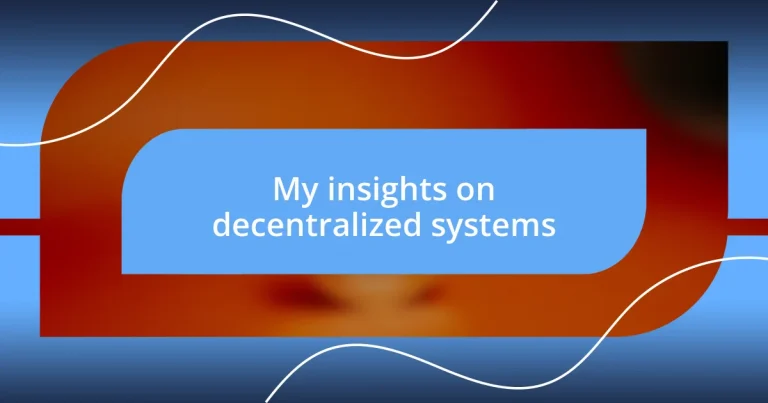Key takeaways:
- Decentralized systems empower collective decision-making, enhance resilience, and promote trust and transparency among participants.
- Key challenges include coordination issues, accountability without centralized authority, and security vulnerabilities that necessitate strong protective measures.
- Emerging technologies like blockchain, P2P networks, and DeFi are reshaping governance, finance, and community engagement, indicating a shift towards more democratized systems.
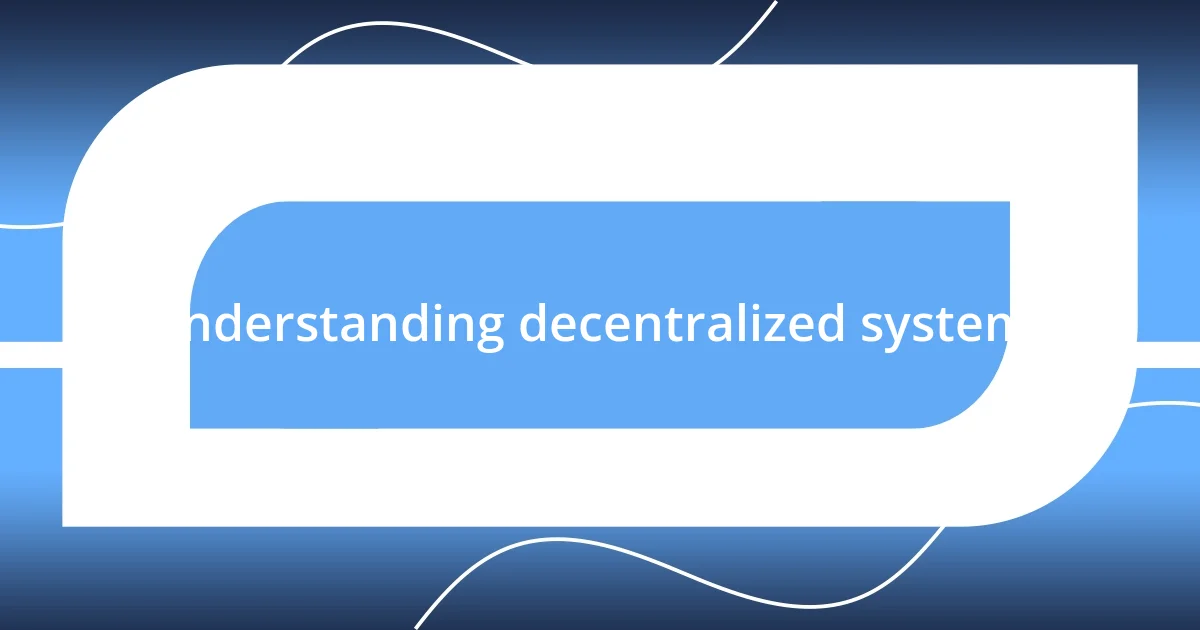
Understanding decentralized systems
Decentralized systems operate on the principle of distributing power and authority across a network, rather than concentrating it in a single entity. I remember feeling a sense of liberation when I first encountered this idea; it’s like realizing that you can work collaboratively without a heavy hand dictating every move. Wouldn’t it feel empowering to make decisions collectively rather than waiting for someone at the top to pull the strings?
At the core of decentralized systems is the elimination of single points of failure. This idea is particularly compelling because it brings resilient structures that can function even when parts of the network fail. I’ve experienced this firsthand in a community project where we distributed responsibilities. It was exhilarating to see how, despite setbacks, our collective efforts continued to thrive. Can you imagine the freedom that comes from knowing that the success of a project doesn’t rest on one person’s shoulders?
Furthermore, decentralized systems typically enhance transparency and trust. I often think back to when I joined a decentralized finance group; the open sharing of information made me feel more connected and secure. It raised interesting questions in me: How does trust flourish when everyone has equal access to data? This model not only fosters inclusion but allows for a richer discourse among participants, transforming the way we think about collaboration and community.
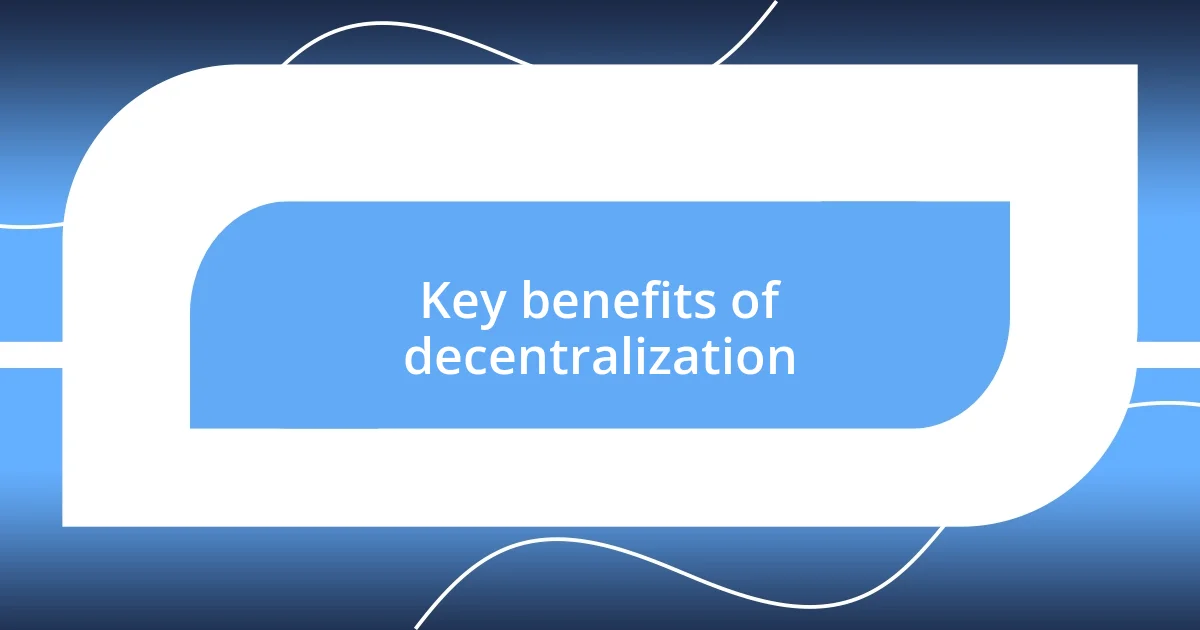
Key benefits of decentralization
One of the key benefits of decentralization is the empowering nature of distributed decision-making. I vividly recall participating in a local community board that practiced decentralized governance. Each member’s voice counted, and it felt refreshing to engage in meaningful discussions where everyone contributed equally to the direction we took. It’s remarkable how such an inclusive approach can boost motivation, as everyone feels invested in the outcomes.
Another significant advantage is the resilience that decentralized systems promote. When I think about the days spent working on a decentralized project, I recall how unexpected challenges emerged, like software bugs or staffing issues. Instead of crumbling, our group rallied together, each person taking charge of their responsibilities, which kept everything running smoothly. Here are a few key benefits of decentralization to consider:
- Reduced Risk: Eliminating single points of failure minimizes vulnerabilities within the system.
- Greater Inclusion: Decision-making power is shared, allowing diverse perspectives to shape outcomes.
- Enhanced Trust and Transparency: Open access to information cultivates a trustworthy environment.
- Increased Innovation: The freedom to experiment encourages more creative solutions and ideas.
- Community Empowerment: Individuals feel a stronger sense of ownership, increasing engagement and commitment.
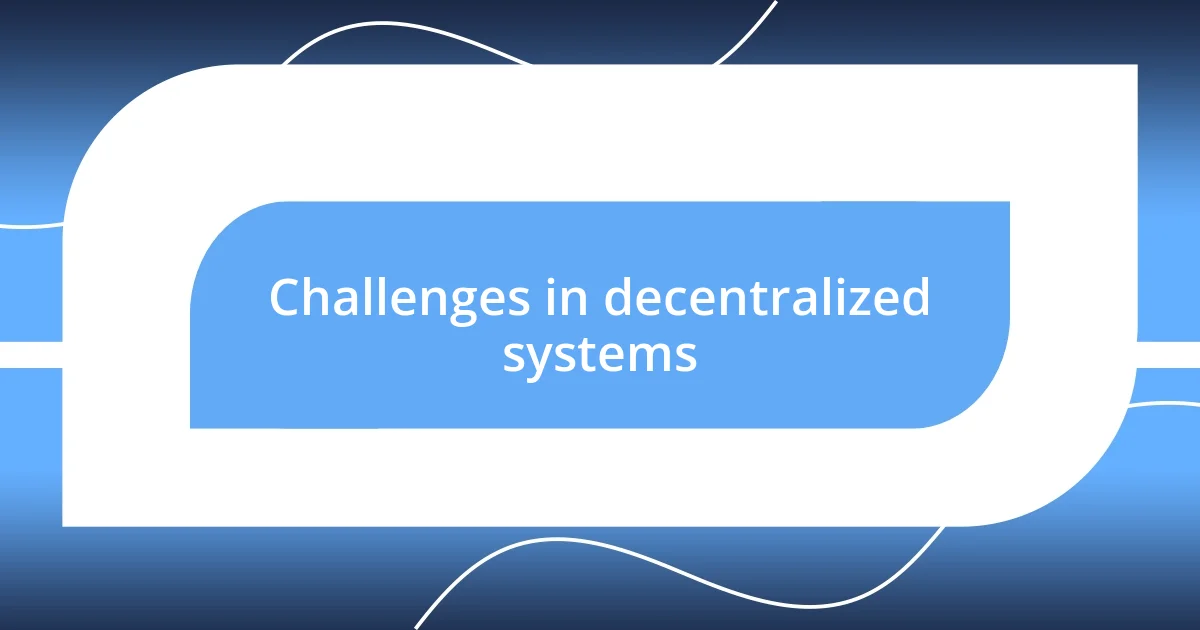
Challenges in decentralized systems
Decentralized systems can encounter their fair share of challenges. One significant hurdle is coordination among participants. I recall a time I participated in a decentralized project where, despite everyone having good intentions, we struggled to align our efforts. Miscommunications often led to duplicated work or missed deadlines. It’s fascinating to think about how the very structure designed for empowerment can sometimes create silos instead of collaboration.
Another challenge that stands out is the question of accountability. With no centralized authority, it can be tricky to determine who is responsible for specific outcomes. I remember a discussion in a community group where we questioned the lack of a clear leader. It sparked a debate about how shared decision-making can sometimes dilute responsibility. Who ensures that tasks are completed when everyone is equally accountable? It’s a thought-provoking dilemma that often requires us to develop new frameworks for oversight.
Security concerns also loom large in decentralized systems. I’ve seen firsthand how vulnerabilities can emerge when numerous nodes are involved. For instance, a breach in one part of the network could potentially compromise the entire system. This experience made me realize that while decentralization offers many advantages, it also calls for a more rigorous approach to cybersecurity and data integrity to safeguard the collaborative spirit.
| Challenge | Description |
|---|---|
| Coordination | Difficulty in aligning efforts among participants can lead to miscommunication and duplicated work. |
| Accountability | Without a central authority, determining responsibility for outcomes can become problematic. |
| Security | Increased vulnerabilities as breaches in one part of the network may threaten the entire system. |
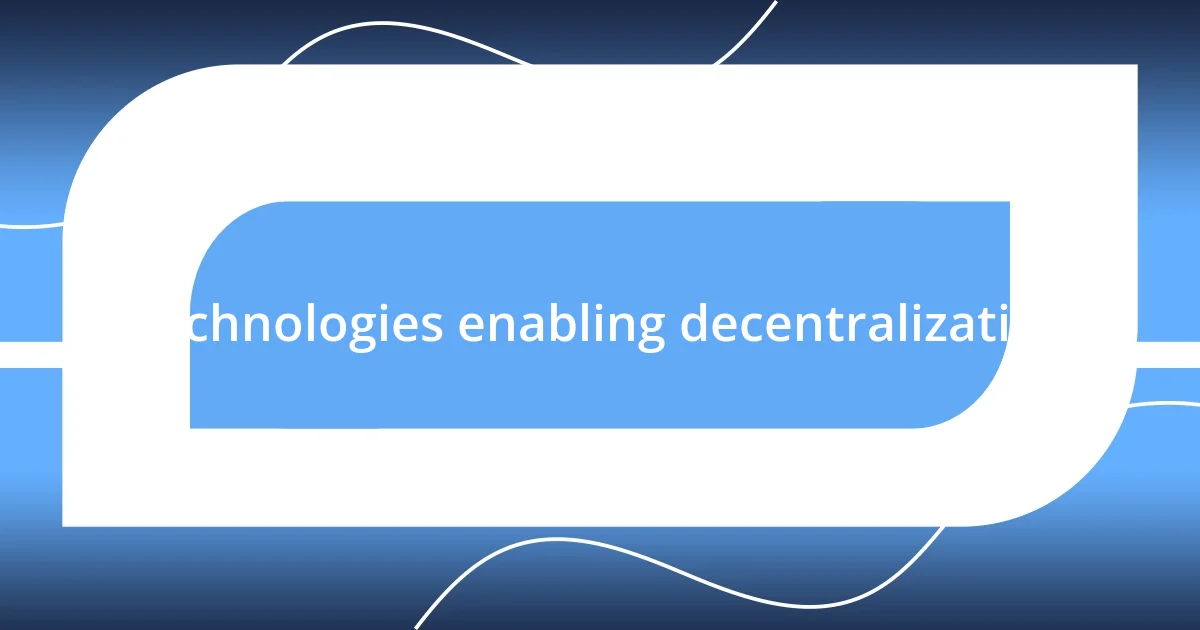
Technologies enabling decentralization
The backbone of decentralization is undoubtedly blockchain technology. My journey into understanding this led me to attend a local seminar, where the speakers passionately discussed how blockchain’s distributed ledger system fundamentally shifts trust away from centralized authorities. While exploring practical applications, I realized that the transparent nature of blockchain not only enhances accountability but also fosters an environment where all participants can validate transactions autonomously. Isn’t it fascinating how this technology has the potential to redefine relationships in business and governance?
Another pivotal technology is peer-to-peer (P2P) networks. Reflecting on my experiences with file-sharing platforms, I found these networks incredibly empowering. They allow users to connect directly, eliminating the need for intermediaries. This structure not only democratizes access but also creates a sense of community among users. When participants rely on each other, it raises an intriguing question: How could we leverage P2P systems in other areas, like education or resource sharing, to amplify collective impact?
Lastly, look at decentralized finance (DeFi) platforms. They’re reshaping the way we think about traditional finance by allowing anyone with an internet connection to access financial services directly. I remember first diving into DeFi and being stunned by the myriad of opportunities that suddenly felt within reach. This technology empowers not only individuals but also entire communities, challenging the status quo of banking. As I explored these platforms, I couldn’t help but wonder, what new possibilities could emerge if this level of access became the norm?
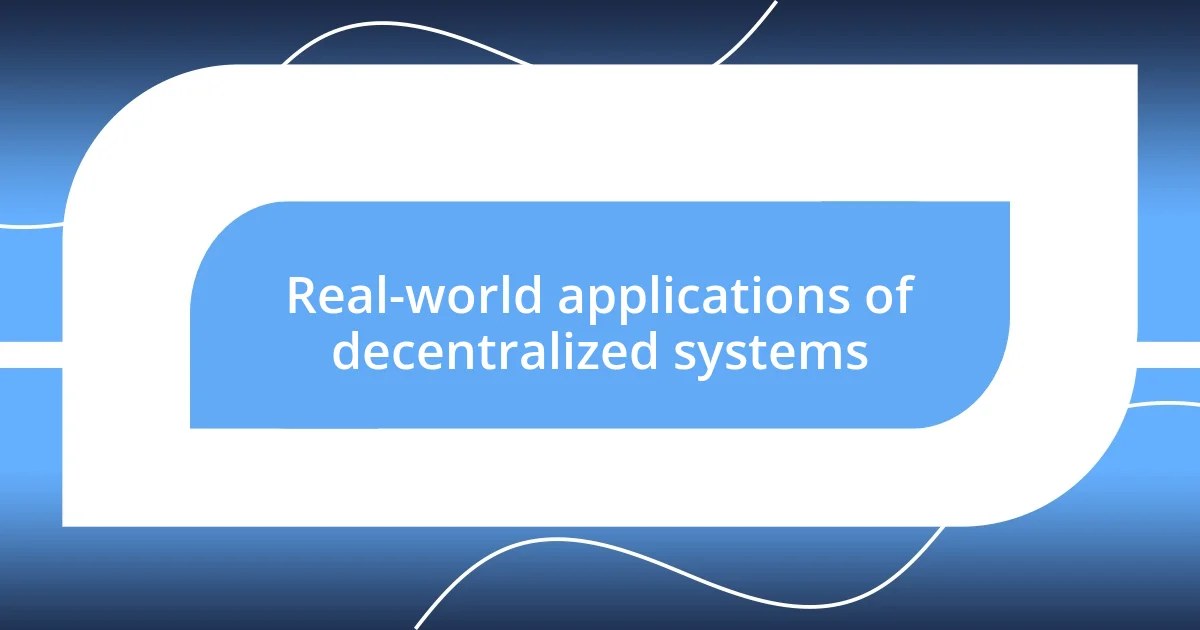
Real-world applications of decentralized systems
Decentralized systems are making waves in various sectors, notably in supply chain management. I remember my surprise when I learned how companies like IBM are using blockchain to enhance transparency and traceability in their supply chains. This not only helps in tracking products from origin to destination but also strengthens consumer trust. Isn’t it intriguing to think how real-time information sharing can prevent fraud and ensure ethical sourcing?
Another compelling application I’ve encountered is in decentralized social networks. I was initially skeptical about their effectiveness compared to traditional platforms. However, after joining a few, I noticed a refreshing change: more control over my data and interactions. These networks prioritize user privacy and create spaces where individuals can engage without the interference of central authorities. Doesn’t that challenge the existing norms of social media in a meaningful way?
Lastly, I must highlight decentralized energy systems, which are truly a game-changer. I’ve seen communities band together to harness solar power, creating microgrids that function independently from traditional utilities. The empowerment I felt during a community meeting where we discussed energy sharing was palpable—everyone had a voice. Just imagine the profound impact we could make by decentralizing power generation, especially in areas with limited access to electricity. This is where technology meets community resilience, and it excites me to envision the possibilities ahead!
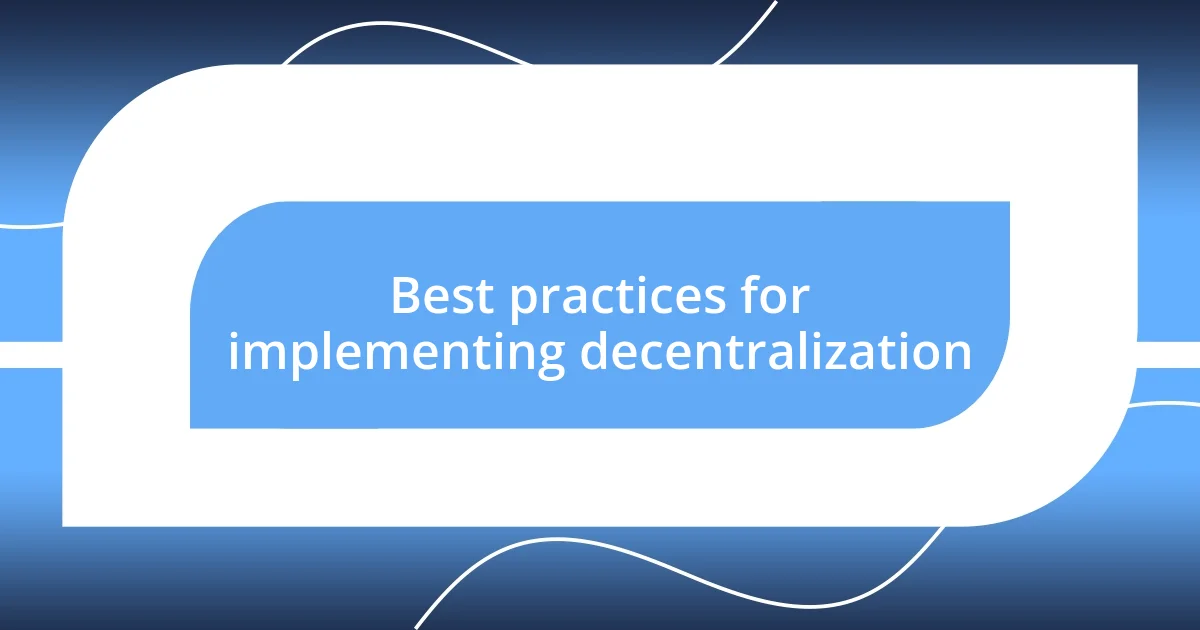
Best practices for implementing decentralization
One of the best practices for implementing decentralization is starting small and gradually scaling up. I remember when I first helped a small startup transition to a decentralized model. We began by decentralizing their project management, allowing teams to operate independently. This approach not only empowered the teams but also revealed unforeseen efficiencies—a clear testament to how taking baby steps can produce substantial gains.
Another important aspect is prioritizing security from the get-go. In my experience, it’s easy to overlook this when the excitement of decentralization kicks in. However, I learned the hard way that neglecting safe protocols can lead to vulnerabilities. Establishing strong security measures, such as robust encryption and multi-signature transactions, will fortify your system and build trust among users. After all, when stakeholders feel secure, they’re more likely to embrace changes.
Regularly engaging with the community is also crucial. During a recent project, I found that hosting open forums to discuss hurdles and feedback encouraged collaboration and resulted in innovative solutions. By listening to users, decentralization doesn’t just become an abstract principle; it transforms into a living, breathing entity that reflects the collective voice of its participants. Isn’t it fascinating how community engagement can drive buy-in and foster a culture of collective ownership?
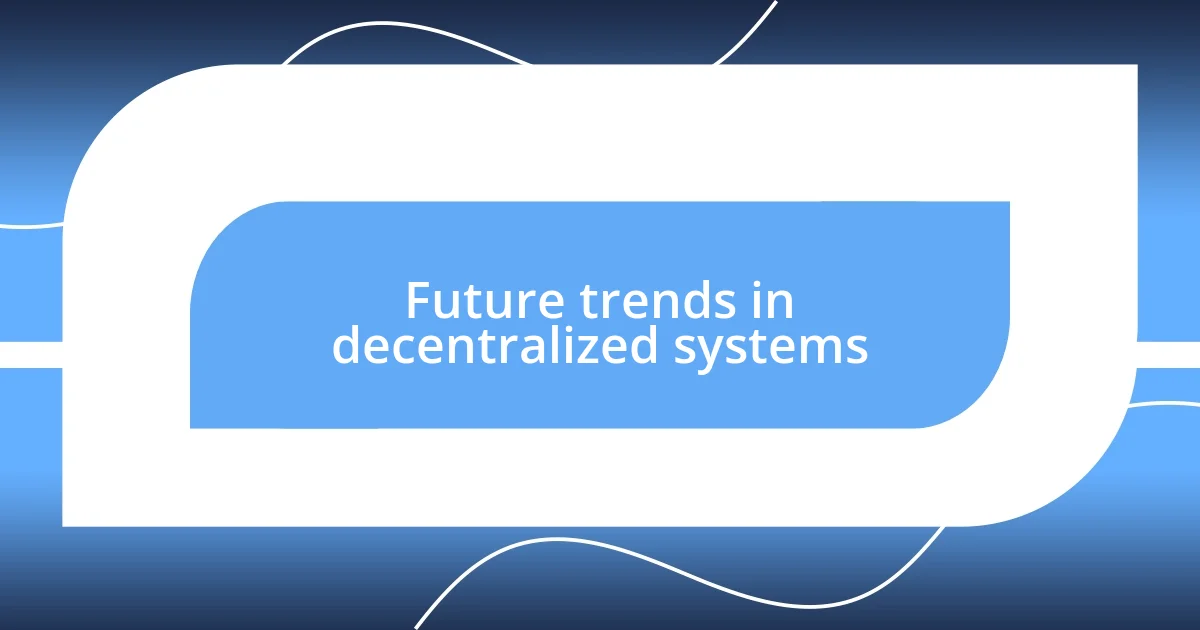
Future trends in decentralized systems
The future of decentralized systems holds immense promise, particularly with the rise of decentralized finance (DeFi). Reflecting on my initial venture into DeFi, I was amazed to see how users could trade and borrow directly through smart contracts without relying on traditional banks. This shift not only democratizes access to financial services but also empowers individuals to manage their own financial destinies—how liberating is that?
As I dive deeper into the realm of decentralized identity management, I can’t help but feel a sense of excitement about the potential privacy benefits. Last year, I experimented with a blockchain-based identity platform. The ability to control who had access to my personal data was revelatory. It was like reclaiming a piece of myself that had been lost in the sea of data breaches. Isn’t it fascinating to consider how this might reshape our online interactions and reduce identity theft?
Lastly, I foresee a significant surge in the use of decentralized autonomous organizations (DAOs). My first encounter with a DAO was during a collaborative project where decisions were made collectively. The experience was exhilarating; it felt like being part of a digital democracy. As we move forward, could this model redefine how organizations operate and empower individuals? I truly believe that the evolution of DAOs will shift power dynamics across industries, making governance more transparent and participatory.












